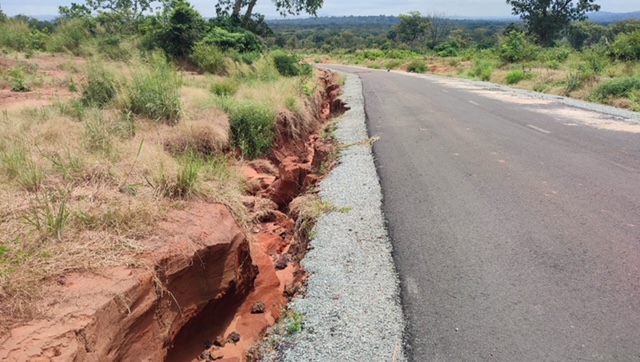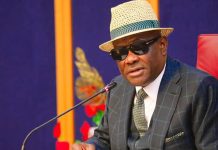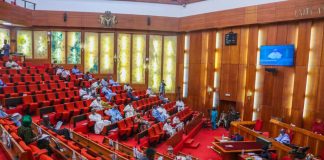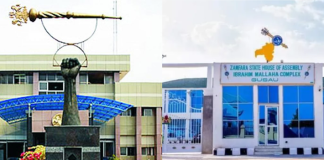🌿 Ruzu Non-Alcoholic Herbal Bitters
Ruzu Non-Alcoholic Herbal Bitters is a natural health supplement specially formulated to:
- ✅ Promote general wellness
- ✅ Detoxify the body
- ✅ Support the treatment of various ailments
Made from a powerful blend of 100% organic and medicinal herbs, Ruzu is completely alcohol-free, making it ideal for:
- 👪 All age groups
- 🌱 Health-conscious individuals
- 🌿 Anyone seeking non-alcoholic herbal remedies
Whether you're looking to boost your vitality, cleanse your system, or support healing the natural way, Ruzu Bitters offers a trusted herbal solution.
In this investigation, ARINZE CHIJIOKE looks at how the Ecological Fund Office violated procurement law by diverting a multi-million-naira erosion control project in a community in Udi Local government, Enugu State, to the community of a former minister leaving residents at the mercy of erosion. It also captures how the contractor poorly executed the diverted project ‘
Whenever rain clouds begin to gather, Ukamaka Agu, a resident of Oma-Eke, a town in Udi Local Government (LGA) in Enugu State, is overcome by anxiety. And she barely sleeps any night it rains.
“I would always come out in the rain with my hoe and a shovel and stand close to a water channel created by erosion beside the compound, waiting to redirect water from flowing into my room, but it is often too much for me to handle,” she lamented. Agu’s room has been flooded several times, her clothes soaked in water and her foodstuffs destroyed. Many nights, she has escaped to safer havens in the community, leaving her property at the mercy of erosion.
This is by no means limited to Agu. In fact, for over two decades, residents of Oma-Eke and the towns that make up Eke community – Enugu-Eke, Ogui-Eke, Ogui-Agu and Amankwo-Eke- have endured the menace of gully erosion which had destroyed road networks, houses and farmlands, threatening the livelihoods of the predominantly agricultural community.
Research conducted by Charlie Aniagolu, Okwu-Delunzu and Tari Iwueke from the Enugu State University of Science and Technology, (ESUT), attributed the menace to natural processes; rainfall, topography, geological properties of soil, in particular texture and the activities of humans, especially deforestation, excavation, drainage structure, farming and animal grazing.
“The inherent characteristics of Eke soil which is porous allows excessive infiltration of rainwater and promotes the spread of soil erosion, especially the gully type,” the research found.
Farmers like Christopher Ejiofor are wary of cultivating when a new farming season approaches as he has lost crops, particularly yam and cassava, countless times due to erosion. To prevent erosion from destroying his house, he constructed stairs at the entrance to the compound.
Ejiofor constructed stairs at the entrance to the compound
“Erosion has now become a yearly occurrence,” he said. “Our roads are being washed away and it keeps getting deeper, we are helpless and fear that our houses along the line might just be eaten up one day,”.
Ejiofor told Naomisophyblog of a community leader who held his daughter’s traditional wedding at an open field because people could not access his house due to erosion.
But it is not just Udi that has endured ecological challenges in Enugu State. Although it is not the most impacted in the South-East, Enugu State has had its fair share of destruction by flooding and erosion. Road networks have been destroyed, buildings have collapsed and large areas of agricultural land have been lost. Udi, Eziagu, Uzo Uwani, Nsukka and Igbo Eze council areas of the state are often the most affected.
In 2022, Nigeria experienced the worst flood in over a decade, destroying nearly 700,000 hectares of land, over 600 deaths and between US$3.79 to $9.12 billionin economic damages. 53,800 hectares of farmland were submerged In four communities in Uzo Uwani, another local government, over 30,000 households were also displaced.
Available data shows that since 2021, the state has received over N3 billion as its share of the ecological fund from the Federal Government. Between 2021 and 2022, the state received N1.993 billion.
Between June 2023 and June 2024, the state received over N1.36bn. From January to June 2024, it received over N660 million. But only over N99 million was allocated to environmental protection. This June, the Enugu State Government set up a task force on erosion to assist the government control and mitigate the impact of flooding in the state.
Finding a solution
Worried by the devastating impact of erosion in Eke, leaders of Oma-Eke, the worst hit of all the communities, met in December 2016 to explore ways to attract government intervention. In 2017, they applied to the Ecological Funds Office (EFO) for support. The EFO was established in 1981 by the Federal Government of Nigeria to help mitigate serious ecological problems around the country. It is currently under the Office of the Secretary to the Government of the Federation (OSGF) and is headed by a Permanent Secretary.
Letter showing award of the contract
The application was accompanied by a bill of quantities for the road, including designs for drainages and culverts, the cost of which was borne by the community. This was in line with the procedure for assessing the agency’s funds which partly states that applications to EFO for support should be accompanied by designs and cost estimates.
The community’s application was approved at a meeting of the Ecological Fund Office Tenders Board held on 7th April 2019. The EFO letter of award dated 8th May 2019, described the project as 3.8 Kilometer erosion control and road improvement work along Enugu Eke-Ogui Eke-Eke Market-Obodo Amankwo-Oma Eke Road Project, in Udi LGA, Enugu State. The contract was awarded to Flab Engineering Services Limited for a sum of Four Hundred and Twenty-Nine Million, (N429, 878, 805) with Eco Project Services Ltd as consultant.
The letter of the award signed by the Assistant Director (Procurement), Mohammed Abdullahi, for the Secretary to the Government of the Federation, stated that the award followed the conditions of the contract and standard bidding documents and that it was “fixed, firm and NOT transferable” with a completion period of six (6) months from the date of the award.
Project was supposed to pass through Obodo Amankwo
To underscore the community’s support, Kenneth Ogwudu, a leader in the community, told Naomisophyblog that the people of Oma-Eke offered the contractor every assistance, including providing security for its equipment and accommodation for the workers for the project’s duration.
The community rolled out the drums in celebration upon learning about the award of the contract, which for them meant the end to years of suffering, threat to lives and means of livelihood caused by erosion.
As Cletus Iruoha, an indigene of Oma-Eke community explained, “the process of award of the contract started from scratch and everything about it centres on Eke. Officers from the EFO came severally to Eke to carry out soil tests and to understand the nature of erosion flow in the communities covered by the contract.”
Project diversion and the shoddy work done
In November 2019, about six months after the contract was awarded, residents of Eke noticed that the project had not commenced in the locations captured in the award letter. By October 2020, they were stunned that the contractor was not executing the project in any of the locations and that the project had actually been diverted to a different area.
Findings by Naomisophyblog, show that the project was moved to Ogui-Agu, the maternal home of then Foreign Affairs Minister, Geoffery Onyeama and St. Paul’s Catholic Church (both in Eke community) as well as the road leading to Umuoka, a different community where Onyeama’s media aid, Flavour Eze, hails from.
Poorly constructed portion of road diverted to maternal home of former Minister
Residents of Oma-Eke noted that the contractor initially brought his equipment but soon took them away after a few days. They also noticed that the diversion sign installed in one of the locations was also removed.
On June 12, 2024, the reporter visited the three locations to which the project was diverted and found that road construction work was done, albeit rather poorly. For example, at Ogui-Agu, it was discovered that parts of the roads were already developing cracks, including the one-sided drainage that was supposed to collect heavy water flow. It was also discovered that erosion had already created a dip water channel on the side without drainage, threatening to wash away that portion of the road.
At the St. Paul’s Catholic Church portion of the road, which was constructed with two side drainages, it was discovered that some parts were already developing cracks. At the Umuoka section, where incomplete drainage was provided, the reporter noted that the asphalt stones used for construction were already wearing off.
St. Paul’s Catholic Church portion of the road
A civil engineer with the Federal Ministry of Works, Enugu who spoke on condition of anonymity because he was not authorised to speak on behalf of the ministry, expressed reservations about the quality of work done by the contractor. His assessment was based on pictures of various portions of the road that our reporter shared with him.
According to him, drainage for the Ogui-Agu portion of the road should have been done on both sides as the adjoining land is at a higher elevation than the road, which explains why erosion is already washing away one part of the road.
He further explained that the contractor needed to do more to control the erosion with adequate drainage systems to ensure that the road lasts. He however approved the quality of work done on the driving surface given the anticipated volume of traffic on the road.
Community’s project was not approved, Onyeama’s aide claims
Amid concerns about the quality of work done, the debate rages as to whether the project was diverted, as claimed by the Oma-Eke community. When contacted, Eze, aide to the former minister, Onyeama, said that no project was diverted, explaining that the EFO did not approve the design submitted by the people of Oma-Eke. His claim, however, contradicts the award letter for the project that our reporter obtained.
Eze said the project was his brainchild, claiming that he wrote the letter requesting a road that would begin from the minister’s house in Enugu-Eke to Oma-Eke, adding that this was endorsed by the minister, after which it was taken to the EFO and approved. He claimed that was the minister’s only involvement in the project. The minister hails from Amankwo, another town in Eke but lives in Enugu-Eke, where his house is located.
Portion of road constructed in community of Onyeama’s aide
Eze further explained that before the EFO project was approved, he also spoke with then Governor of Enugu State, Ifeanyi Ugwuanyi, who approved a two-kilometre road that covered Enugu-Eke, where Onyeama’s house is located and terminated at Eke-Eke Market, which serves the towns.
Naomisophyblog checked the Enugu State Ministry of Budget and Planning and found that there was indeed a road project awarded. However, the contract details differ from that of the EFO in terms of the scope. While the EFO contract was to cover five locations; Enugu-Eke, Ogui Eke, Eke Market, Obodo Amankwo and Oma Eke Road, that of the Enugu state government was meant to cover three locations – Enugu-Eke, Ogui-Eke and Eke-Eke Market, leaving out Obodo Amankwo and Oma Eke.
As Eze explained, “Upon discovering that the Enugu State government had started work on the road, the EFO wanted to take the contract away from Enugu State to another one with an erosion problem.”
However, according to him, to ensure that Enugu State did not lose out, himself and Onyeama “wrote to the presidency through the EFO, asking for the project to be taken to other locations in Enugu State with similar ecological challenges,”.
READ ALSO:INVESTIGATION: Enugu community at mercy of erosion after Ecological Funds Office diverted erosion control project
With three locations (Enugu-Eke, Ogui-Eke and Eke-Eke Market) covered by the state government contract, one would have expected the EFO to cover the remaining two locations in the award letter (Obodo Amankwo and Oma-Eke). Also, assuming that the EFO contractor met the state government’s contractor on site, it would have been reasonable to confirm where the state government’s project ends and then know where to begin and not completely divert the project to other locations.
Eze confirmed that the EFO project was “relocated” to the communities mentioned earlier. He, however, claimed that he was already pushing for a second phase of the project which he had applied for that would extend to Oma-Eke from the Ogui-Agu end.
The design, according to him, had already been submitted, but it was cancelled after the people of Oma-Eke protested during the commissioning of the road project which caused EFO to discontinue the project.
The commissioning, protesters and Lawal meeting with leaders of Ogui-Agu
Indeed, at the commissioning of the road project in Ogui-Agu, residents of Oma-Eke had protested against what they described as “monumental fraud”. They displayed placards with inscriptions such as “Corruption Unlimited; ICPC where are you; EFCC where are you; Fraud Unlimited; Public Procurement Act Crucified,” among others.
“We had been waiting for the contractor to come and do the project; only for us to hear that a road was being commissioned,” said Godwin Onwusi, a member of the Oma-Eke community. “We felt betrayed”.
Following the protests, the Enugu State government added another 800 metres to its initial 2km project which now extended to Oma-Eke. However, a greater part of the community was not covered by the extension.
New project locations not captured on EFO project document
Interestingly, an official EFO document of completed projects between May 2015-October 2022, reviewed by our reporter, lists the erosion project in Eke as 100% completed under the project name “Enugu Eke-Ogui Eke-Eke Market-Obodo Amankwo-Oma Eke Road Project” which the EFO did not execute in the locations listed, but instead diverted to Ogui-Agu, St Paul’s Church and Umuoka communities.
Project captured as 100% complete but not with names of the new locations
Upon request by our reporter, Eze did not provide any proof of the letter he claimed to have written to EFO on the basis of which the contract was purportedly awarded or the letter of the award that specifies the exact areas covered in the contract.
On Tuesday, June 27, 2024, Naomisophyblog sent a Freedom of Information Act, (FOIA) letter to both the Secretary to the Government of the Federation (SGF) and the Permanent Secretary of the EFO requesting details of the project and reasons behind its diversion. Although it was acknowledged, no response was received from either of the offices as at the time of this publication. Similarly, an email was sent on Friday, June 28, 2024, to Eco Projects Services Ltd, the project consultant, seeking clarification on the controversy surrounding the project to which it has yet to reply.
However, during the February 4, 2021 commissioning of the Ogui-Agu portion of the road project, Habiba Lawal, EFO Permanent Secretary represented by Mathias Eluma, Director Soil Erosion and Flood Control was unequivocal that Foreign Affairs Minister (Onyeama) initiated the project through a request for urgent intervention sent to the EFO to arrest the continuous erosion, flood and other ecological challenges in the communities.
An article on the commissioning of the road published on EFOs website claimed that the project had improved the living standard of the people as “the incessant erosion and flooding which had resulted to loss of lives and properties had been addressed”.
The Onyeama role in the project was further underscored during the March 3, 2021 thank-you visit to the EFO by leaders of Ogui-Agu following the commissioning of the project where the Permanent Secretary reiterated that it was the former minister who sponsored the project, urging the benefitting communities to make use of the roads and drainages without causing any damage to them.
FOI request not responded to
Yet, the Oma-Eke community insisted that the effort to bring the project was solely theirs. According to Godwin Owusi, the former minister was not involved at any stage of the project’s application process, claiming that he, repeatedly ignored their pleas to use his influence to get the government interested in the project.
“We kept pushing on our own till it was finally approved and funds released,” Onwusi said. “And now, he has used his influence to divert the project to different locations other than what is in the contract award letter,”.
Contract bogged down in court
When contacted for his reaction to the allegations of contract diversion, Emeka Udokporo of Flab Engineering Services declined to comment saying the matter is in court. The matter is, indeed, a subject of litigation at the Federal High Court Enugu, with Oma-Eke community as the plaintiff and Flab Engineering Services Ltd, Eco Projects Services LTD, Permanent Secretary Ecological Funds Office and the Attorney General of the Federation as defendants.
In the affidavit sworn by Christopher Onwumelu, Comrade Samuel Ifoh, Iruka Ejiofor, Festus Metta, Uwaechie Metta, and Harold Ofordu on behalf of Oma-Eke, the community is demanding that the contractor go back to execute the contract as contained in the award letter or that the company pay back to the government all the money it has received given that the contract was not executed in the original locations.
In its defence, the contractor argued that there was a “change of project sites” by the EFO which it claimed was in writing and duly signed by the Permanent Secretary. According to the company, the change of location became necessary upon discovery that a different contract awarded by the Enugu State government had been executed at the same location, arguing that it would be a waste of resources for two contractors to be working on the same project.
“There was no fraudulent diversion of the contract because we obeyed and carried out the instruction of the Permanent Secretary (of the Ecological fund who awarded the contract),” it claimed.
Disputing the contractor’s claim in the court document, Oma-Eke community members maintain that the state government’s project, which did not still capture parts of their community, only came as an intervention, following the controversy generated by the diversion.
Where state government’s project ended
Another party in the case, the Office of the Secretary of the Government of the Federation (SGF) under which the EFO operates, has also responded to the suit. In an affidavit dated June 24, 2021, Zakaria Audu, a legal officer in the Office of the SGF, confirmed the change of project sites noting that it was Onyeama who suggested and provided three (3) alternative locations “within the same Eke community, measuring the same size as the original site and location.”
However, contrary to the SGF’s claim, our investigation found that one of the locations, Umuoka, where Onyeama’s aid (Eze) comes from, is a different community outside Eke. The SGF’s court response also contradicts claims by Eze that the former minister was not involved in the project apart from appending his signature to the initial letter of application for the project.
Apparently unhappy with the litigation, then Permanent Secretary of EFO, Habiba Lawal, told the visiting leaders of Ogui-Eke community who had paid her a thank you visit that the implication of the action of Oma-Eke going to court over the diversion is that no project can come to their town again. She, however, urged Eke community to settle the controversy surrounding the project internally.
Project Diversion- A Gross violation of the law
As the case makes its way through Nigeria’s notoriously slow court system, experts agree that project diversion violates the provisions of the Public Procurement Act 2007. As Akingunola Omoniyi, who heads the Network for the Actualisation of Social Growth and Viable Development (NEFGAD), a procurement advocacy group explains, project diversion in the course of execution violates the Procurement Act.
He observed that moving the contract to a different location requires an entirely new procurement process to gain legality, stressing that the diversion cannot be effected midway or after appropriation by any entity/authority, including the Permanent Secretary of any procuring entity.
“A public procurement proceeding is unique in its entirety with no room for any ambiguity that will make it unimplementable or untraceable for public accountability and scrutiny, hence, the mandatory requirement of project evaluation/feasibility and impacts assessments reports as a precondition for any procurement proceeding,” he stated.
Similarly, Vahyala Kwaga, Senior research and policy analyst at Budgit, argues that the Permanent Secretary does not have the power to unilaterally change the location of a project without the buy-in of a Minister (as this investigation has shown) or, depending on the value of the project, the Federal Executive Council.
Ministries, Departments and Agencies (MDAs) require the approval of FEC to award contracts for the procurement of goods valued at N100 million naira and above, works valued at N500 million naira and above, and consultant and non-consultant services valued at N100 million naira and above.
He however noted that even if the parties, (the EFO and the contractor) have agreed that the location should change (maybe due to some issue in the acquisition of land), it should be publicly communicated for transparency.
Back in Oma-Eke, residents continue to count losses, with erosion destroying roads, and farms and submerging houses. Amidst the losses, one question bogging their minds, is whether or not they will ever get justice.
This investigation is supported by the John D. and Catherine T. MacArthur Foundation and the International Centre for Investigative Reporting.
The post INVESTIGATION: Enugu community at mercy of erosion after Ecological Funds Office diverted erosion control project appeared first on Latest Nigeria News | Top Stories from Naomisophyblog.
















